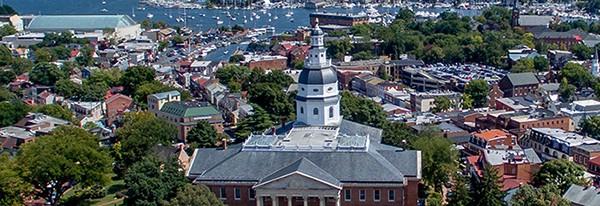Date:
Contacts: Bobbi Collins, Marketing Specialist, Historic Annapolis, Inc., 410.626.1033, bobbi.collins@annapolis.org
Becky Wood, Content & Communications Manager, Maryland Center for History and Culture, 410.685.3750 x399, bwood@mdhistory.org
Annapolis, Maryland— In anticipation of the upcoming 250th anniversary of the American Revolution in 2026, Historic Annapolis (HA) and the Maryland Center for History and Culture (MCHC) are pleased to announce the joint acquisition of a rare and important pair of silver canns originally owned by founding father and Signer of the Declaration of Independence William Paca and his wife, Mary. The 18th-century drinking vessels, which descended in the family, were auctioned by Sotheby’s New York auction house during Americana Week on January 25, 2025.
Canns were popular vessels for beer or cider used throughout the mid-to-late 1700s. Silver made these canns especially refined, as well as resilient to enthusiastic toasting, as any dents or dings could be hammered out by a local silversmith.
Engraved with the monogram “WMP” (the shared cypher of the Signer and his wife), these objects were made by Charles Wright and Thomas Whipham of London in 1763, the same year William and Mary Paca married and began construction of their town house in downtown Annapolis.
Due to their provenance and connection to the Paca family, the canns will enhance interpretation at both institutions, being displayed alternately at HA and MCHC as a tangible connection to the period of our nation’s beginnings. Paca was a member of the Annapolis Sons of Liberty and served three terms as Governor of Maryland.
HA and MCHC established an innovative partnership effort to bring these artifacts back to Maryland, joining forces to purchase the pair of canns with the intent to share the objects between the two organizations. Through this collaboration, the objects will be accessible to a broader audience through a variety of museum exhibits and interpretation created by both institutions.
“We are thrilled to partner with the Maryland Center for History and Culture for this extraordinary effort to display these historical items in Maryland,“ says Karen Theimer Brown, President & CEO of Historic Annapolis. “We hope this unprecedented new partnership can serve as a model for future endeavors.”
“As we prepare to commemorate the 250th anniversary of the signing of Declaration of Independence in 2026, these canns serve as a reminder of Maryland’s profound contributions to American history,” adds Katie Caljean, President & CEO of MCHC. “It is exciting to innovate and collaborate with Historic Annapolis on this unique partnership. Objects such as these are a jumping off point to better understand the complexities of everyday life in early Maryland”
Both institutions are part of statewide initiatives to recognize the 250th anniversary of the American Revolution, nationally branded as America 250, leaning into the promise of our nation’s founding documents offering “life, liberty, and the pursuit of happiness” and the assertation that “All men are created equal,” while acknowledging the inherent contradiction of the Signers in their enslavement of people who labored on their plantations and in their homes. Items such as these help to illuminate the complex stories of all those who lived and worked in homes like the Paca House.
When on display at the William Paca House & Garden, a National Historic Landmark owned by the State of Maryland and managed by HA since 1965, the canns will join the small collection of objects owned by William and Mary. This includes a pair of salt cellars and a cruet set, also London-made and bearing the same engraved monogram.
When in the custody of MCHC, the canns will be displayed in the long-term exhibition The Unfinished Revolution: Maryland in the Wars for Independence, which ties together the French and Indian War, the American Revolutionary War, the Quasi-War, and the War of 1812 as one connected narrative. The canns will be displayed alongside a monumental 1772 portrait of Paca by Charles Willson Peale, on loan from the Maryland State Archives, Commission on Artistic Property, in a section on the four Maryland Signers of the Declaration.
This acquisition was made possible by this partnership between HA and MCHC, as well as through the generous support of Historic Annapolis’s donors, docents, volunteers, and members.
About Historic Annapolis
Established in 1952, Historic Annapolis is the leading nonprofit preservation and history organization in Annapolis, Maryland. Our mission is to Preserve and Protect the historic places, objects, and stories of Maryland’s capital city, and provide engaging experiences that Connect people to the area’s diverse heritage. Historic Annapolis is one of six Smithsonian Affiliates in Maryland and is accredited by the American Alliance of Museums. For more information or to get involved with Historic Annapolis, visit annapolis.org.
About Maryland Center for History and Culture
The Maryland Center for History and Culture (MCHC) collects, preserves, and interprets the history, art, and culture of Maryland. Originally founded as the Maryland Historical Society in 1844, MCHC inspires critical thinking, creativity, and community through its Museum, Library, and education programs. Learn more at mdhistory.org.


